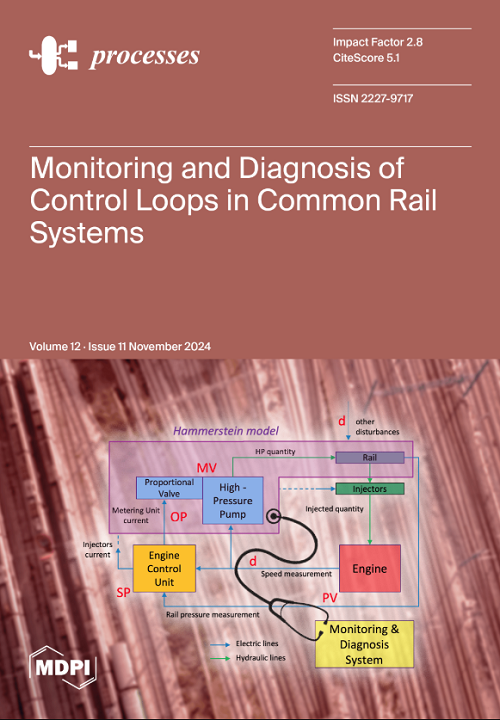A Novel CEM-Based 2-DOF PID Controller for Low-Pressure Turbine Speed Control of Marine Gas Turbine Engines
IF 2.8
4区 工程技术
Q2 ENGINEERING, CHEMICAL
引用次数: 0
Abstract
Gas turbine engines have several advantages over piston reciprocating engines, such as higher output per unit volume, reduced vibration, rapid acceleration and deceleration, high power output, and clean exhaust gases. As a result, their use for propulsion in ships has been steadily increasing. However, gas turbine engines exhibit significant parameter variations depending on the rotational speed, making the design of controllers to ensure system stability while achieving satisfactory control performance, a very challenging task. In this paper, a novel CEM-based 2-DOF PID controller design technique is proposed to ensure the stability of a gas turbine engine while improving tracking and disturbance rejection performance. The proposed controller consists of a PID controller focused on enhancing disturbance rejection performance and a set-point filter to improve tracking performance. The set-point filter is composed of gains from the controller and a single weighting factor. When tuning the gains of the controller, the maximum sensitivity is considered to maintain an appropriate balance between system stability and response performance. The key novelty of this study can be summarized in two main points. One is that the controller is designed by matching characteristic equations, and by setting the roots of the desired characteristic equation as multipoles, the gains of the PID controller can be tuned with only one adjusting variable, making the tuning of the 2-DOF controller easier. The other is that the controller parameters are tuned based on maximum sensitivity, thus taking into account the robust stability of the control system. To demonstrate the feasibility of the proposed method, simulations are conducted for four scenarios using various performance indices.基于 CEM 的新型 2-DOF PID 控制器,用于船用燃气轮机发动机的低压涡轮转速控制
与活塞式往复发动机相比,燃气涡轮发动机具有单位体积输出功率高、振动小、加减速快、功率输出大和废气清洁等优点。因此,燃气涡轮发动机在船舶推进方面的应用一直在稳步增长。然而,燃气涡轮发动机会因转速不同而出现显著的参数变化,这使得控制器的设计成为一项极具挑战性的任务,既要确保系统的稳定性,又要达到令人满意的控制性能。本文提出了一种基于 CEM 的新型 2-DOF PID 控制器设计技术,以确保燃气涡轮发动机的稳定性,同时提高跟踪和干扰抑制性能。所提出的控制器由一个侧重于提高干扰抑制性能的 PID 控制器和一个用于提高跟踪性能的设定点滤波器组成。设定点滤波器由控制器增益和单一加权因子组成。在调整控制器增益时,考虑了最大灵敏度,以保持系统稳定性和响应性能之间的适当平衡。本研究的主要创新点可归纳为两点。一是通过匹配特征方程来设计控制器,通过将所需特征方程的根设为多极,PID 控制器的增益只需一个调节变量即可调整,从而使 2-DOF 控制器的调整变得更加容易。另一方面,控制器参数的调整基于最大灵敏度,从而考虑到控制系统的鲁棒稳定性。为了证明所提方法的可行性,我们使用各种性能指标对四种情况进行了模拟。
本文章由计算机程序翻译,如有差异,请以英文原文为准。
求助全文
约1分钟内获得全文
求助全文
来源期刊

Processes
Chemical Engineering-Bioengineering
CiteScore
5.10
自引率
11.40%
发文量
2239
审稿时长
14.11 days
期刊介绍:
Processes (ISSN 2227-9717) provides an advanced forum for process related research in chemistry, biology and allied engineering fields. The journal publishes regular research papers, communications, letters, short notes and reviews. Our aim is to encourage researchers to publish their experimental, theoretical and computational results in as much detail as necessary. There is no restriction on paper length or number of figures and tables.
 求助内容:
求助内容: 应助结果提醒方式:
应助结果提醒方式:


